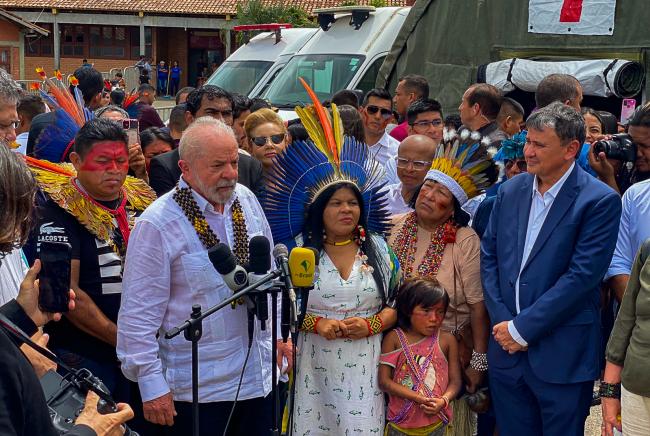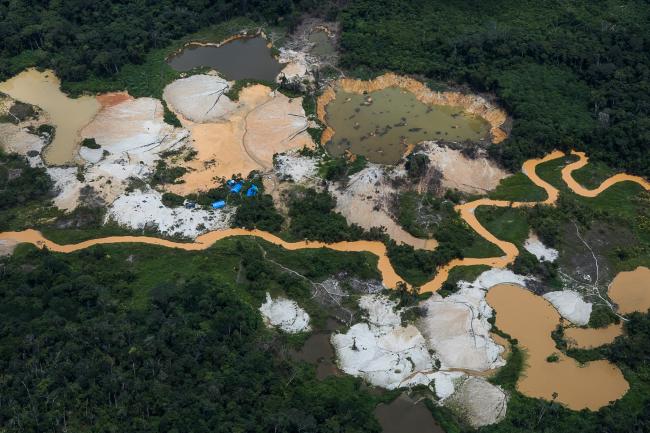
Brazilian law, following the United Nations Convention, defines genocide as “acting with the intent to destroy, in whole or in part, a national, ethnic, racial, or religious group.” The Brazilian Federal Police opened an investigation in January into Indigenous genocide and the omission of aid to the Yanomami people by the government of former Brazilian President Jair Bolsonaro. This is not the first time Bolsonaro has been involved in such an accusation. Previously, in August 2021, he was accused of ecoocide at the International Criminal Court in The Hague, Netherlands, for “crimes against humanity” due to his dismantling of environmental protections and violations of Indigenous rights.
"The former president was avowedly anti-Indigenous. He favored illegal activities in Indigenous territories and questioned the legal framework that supports Indigenous territorial rights," says Estêvão Senra, geographer and analyst at the Instituto Socioambiental, a non-governmental organization dedicated to defending the rights of Brazil’s Indigenous peoples.
Throughout his political trajectory, Bolsonaro confirmed this position in numerous public speeches. While still a congressman in 1998 he declared: “It’s a shame that the Brazilian cavalry hasn’t been as efficient as the Americans, who exterminated the Indians." In April 2017, in his pre-campaign for president of the republic, the far-right politician promised not to demarcate “even a centimeter of Indigenous lands in the country,” and as president he kept his promise. In office, he defended gold mining on Indigenous land multiple times.
Today, in the midst of an ongoing humanitarian crisis in Indigenous communities—in large part a result of Bolsonaro’s anti-Indigenous platform—Brazil finally sees a glimmer of hope for its native peoples after his departure from the presidency.
Luiz Inácio Lula Da Silva, who took office on January 1, fulfilled his campaign promise and created Brazil’s first-ever Ministry of Indigenous Peoples, headed by Indigenous leader Sônia Guajajara. "It's a demonstration that Indigenous peoples are going to have greater protagonism in the government” said Senra. “The status of ministry is a way of recognizing this."
A Community on the Edge of Genocide
"We're not able to count the bodies." This was how the SUMAÚMA portal summarized data and images released by Indigenous institutions documenting the humanitarian crisis among the Yanomami, who occupy the largest Indigenous territory in Brazil. On January 20, SUMAÚMA reported that the number of deaths of children under 5 years old from what they call “avoidable causes” increased by 29 percent in Yanomami territory during Bolsonaro’s government. An estimated 30,000 Indigenous peoples live in the Yanomami rainforest reserve located in northern Brazil, which stretches across the states of Roraima and Amazonas.
The alarming photos in the article reflect the magnitude of the tragedy: 570 Indigenous children died in the last four years from hunger, malnutrition, and preventable diseases such as diarrhea and worms. On the same day, Lula’s new government declared a public health emergency for the Yanomami peoples.
“The Yanomami scenario is not just one of a humanitarian crisis, it is a scenario of genocide. It was a thoughtful, purposeful policy, carried out by the Bolsonaro government to ensure the extermination of a people,” said Pagu Rodrigues, an Indigenous sociologist from the Fulni-ô people, an ethnic group in northeastern Brazil.
The catastrophe unfolding in the 96,000 square kilometers (37,000 square miles) of Yanomami Indigenous territory is the result of a series of mounting problems in the region. One central cause is rife across different Indigenous territories in Brazil: organized crime and illegal mining.
In October 2019, the Indigenous expert Bruno Pereira was dismissed from the position of general coordinator of Isolated Indigenous Peoples at the National Indigenous Foundation (FUNAI), after leading actions to combat illegal mining on Yanomami lands. Meanwhile, Bolsonaro’s government was discussing a bill to legalize the activities of illicit goldminers in Indigenous territories. Three years later, in June 2022, Pereira and the British journalist Dom Phillips were murdered while denouncing crimes committed against Indigenous groups in the Javari Valley.
The Humanitarian Crisis Mounts
Senra, who has been working with the Yanomami since 2013, explains that in recent years organized crime in the Amazon has grown in drastic proportions and, as a result, Indigenous territories have suffered acutely. Many of the illicit activities that have historically taken place in these territories have become intertwined with other crimes, such as drug trafficking. “Land grabbing, the sale of illegal wood, mining…there is an important connection between these activities and organized crime,” says Senra.

Widespread illegal mining threatens the survival of those who depend on the land for their sustenance. Highly toxic compounds that are necessary for gold extraction such, as mercury and cyanide, contaminate the lands where Indigenous peoples plant their food and the rivers where they fish. As a result, unregulated mining devastates not only the environment but increasingly harms the health of local communities, causing malnutrition, starvation, death, and the slow extinction of a population. Furthermore, these incursions facilitate the entry of diseases brought by the miners, such as malaria, tuberculosis, and Covid-19, particularly harmful for communities that live partially isolated.
While medical help is desperately needed, criminal groups actively restrict the entry of nurses, doctors, and aid workers who are dissuaded through death threats and other forms of physical punishment.
Organized crime, on the other hand, has easy access and increasing control over Indigenous lands due to the lack of oversight and the absence of government forces responsible for the security and protection of the local population. According to the report “Yanomami under attack,” from April 2022, illegal mining is a longstanding problem in the region, but it has grown precipitously in the last six years. The report, which describes the evolution of illegal mining on Yanomami lands in 2021, was presented by environmental entities and by Senra to the Brazilian Chamber of Deputies. It highlighted 2021 as the worst period of invasion into the territory since it was demarcated 30 years ago.
As of April of last year, some 4,000 hectares (nearly 10,000 acres) of Yanomami land was impacted by illegal mining with more than 40 clandestine trails at the service of miners and drug traffickers, the report shows. Listed among the reasons for the increase were the weakening of policies to protect Indigenous peoples, lack of inspection, and the former government's policy of encouraging mining activity, despite its illegal status.
“The Yanomami are just the tip of the iceberg of a state policy that is generalized, that we have been living since the colonial invasion,” said scholar Rodrigues. “Everyone thinks a lot has changed since then, but we, the Indigenous, know that it is not true. We have periodic cycles in Brazil of governments that assume and guide a genocide.”
Challenges of the New Ministry
The Indigenous Ministry is seen as a historical reparation for Brazil’s past, marked by the decimation of its native population. On January 11, Sônia Guajajara—named one of the 100 most influential people by Time magazine in 2022—was sworn in as the first Minister of Indigenous Peoples in the country's history. Guajajara is now in charge of a government body that represents the estimated 1.4 million Indigenous people living in Brazil, distributed among more than 300 ethnic groups, according to the most recent partial balance of the country’s 2022 census.
In Guajajara’s speech, she highlighted the current humanitarian crisis faced by Indigenous peoples, and pointed out structural problems that need to be prioritized, such as illegal mining, invasions of territories, Indigenous health conditions, and deforestation, among others.
In the first week of the ministry’s operation, Guajajara announced the repeal of a law that would have allocated space for logging on Indigenous lands, decreed by the previous government. “There were many setbacks in the last administration, mainly in terms of territorial protection, which ensured an increase in deforestation data inside Indigenous lands, which until then was rare to be observed,” said Senra. According to a study by the Instituto Socioambiental, deforestation on Indigenous lands increased by 138 percent between 2019 and 2021, compared to the previous three years.
The containment of deforestation is directly linked to the agenda for the demarcation of Indigenous lands, a promise made by the Lula government and the main demand of Indigenous movements. A right guaranteed in the Brazil's 1988 Constitution, demarcation aims to enshrine Indigenous rights to territory, protecting their lands from invasions and occupations. Nonetheless, it was never fully implemented.
“We have most of what would be original Indigenous territory without demarcation,” says Rodrigues. Demarcated Indigenous lands make up only 10 percent of the country and are mostly in the Amazon region. According to Rodrigues, there is an open and explicit policy of deforestation and environmental destruction in the Amazon. “Permission for illegal mining, for logging companies, extensive livestock farming, and large monoculture crops, has put the lives of most of the Indigenous population in that region at risk.”
Ending these incursions is seen as one of the biggest challenges faced by the new government. “We are talking about facing the squatters, the gunslingers, facing the large estates. The discussion about land here is a very serious problem,” says Rodrigues.
To confront these challenges, Senra believes that the way the ministry is being designed—to strengthen and integrate public policies allocated in different ministries— is a wise strategy. “I would say that the challenges are less a problem of a specific theme, but of articulating public policies in cross-cutting themes, such as health and the environment, to ensure greater success.”
An illustration of this joint work can be seen in the crucial role of the Ministry of Health in the Yanomami crisis. In the month since the federal government declared a public emergency, more than 5,000 medical consultations have been conducted in Yanomami territory, revealing urgent health needs. Among several operations being implemented, a field hospital was built in Boa Vista to provide care to Indigenous communities. In a short period of time, the results of these interventions are already being seen. Data from the Yanomami Indigenous Health House (known as Casai) indicated that during this period, 78 percent of a sample group of children with severe malnutrition gained weight.
To put an end to gold mining in the territory, the federal government initiated a “Liberation” operation to expel more than 20,000 illegal miners. Airships and rafts were destroyed, along with the seizure of more than 16 tons of casserita, a mineral illegally extracted from Indigenous lands. One concern is that the gold miners who were not arrested could migrate to other territories where the actions of public authorities are not as forceful. In response, Minister of Justice Flavio Dino said in a press conference that the investigation has been focusing on finding the people and companies financing illegal mining in the state of Roraima, and that are carrying out money laundering with the gold extracted from Indigenous lands. “We have a priority: the financiers, the owners of illegal mines,” he said.
For Rodrigues, opposing the wider economic system of extractivism is necessary. Not only because it promotes unchecked profiteering, but because the future of the Yanomami and all of Indigenous Brazil depend on a future that prioritizes life over profit. "The main ones responsible for this Indigenous genocide," he said, "are those who support this productive model, and want Indigenous lands to guarantee its permanence."
Daniela Rebello is a journalist from Brazil and an Erasmus Mundus Journalism scholar, pursuing a joint master’s degree at Aarhus University and Charles University. She specializes in Totalitarianism and Transition.

